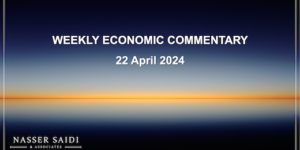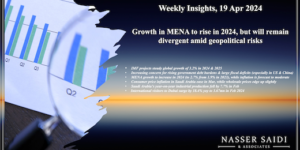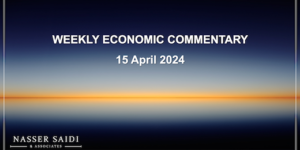Markets
Solid growth and profits outweighed weak jobs data in the US and Asian markets were mostly up, in a week where global financial markets were on edge over the ongoing unrest in Egypt. Regional markets recovered from the sharp decline witnessed last Sunday, when the GCC markets (excluding Saudi) lost close to $ 10bn market cap. GBP surged to a 3-month high, while Trichet’s inflation comments led to a decline in the euro. Oil prices held above $102 and gold prices surged as well, both under pressure from Egypt’s crisis.
Global Developments
Americas:
- Jan non-farm payrolls showed only a modest increase of 36k while unemployment rate recorded a 21-month low at 9.0%.Initial jobless claims declined sharply by 42k to 415k in the week ended Jan 29.
- US core personal consumption index was flat in Dec (Nov: 0.1% mom) while personal spending rose by 0.7% mom, saar (Nov: 0.3%) and personal income by a seasonally adjusted 0.4% (Nov: 0.4%).
- US ISM manufacturing sector recorded a high of 60.8 in Jan, the highest since May 04 buoyed by the new orders sub-index, at 67.8 (Dec: 62) while the price component jumped to 81.5 (72.5). Non-manufacturing ISM rose to 59.4 in Jan (Dec: 57.1), the fastest pace since Aug 05, signaling a strong recovery in real activity.
- Total factory orders rose 0.2% mom in Dec (Nov: +1.3%) to a seasonally adjusted USD 426.8bn.
Europe:
- France and Germany have proposed a European “competitiveness pact” aimed at eliminating restrictions that have held back growth in the Eurozone. This proposal echoes the objectives of the Lisbon agenda, which after 10 years remain largely unfulfilled, but the euro crisis might spur a forceful approach this time.
- German retail sales continued to decline – falling by 0.3% mom in Dec (Nov: -1.9%) – while recording overall yearly growth of 1.2% for 2010. The decline signals weak demand even from the faster recovering Germany.
- Eurozone inflation was up 2.4% yoy in Jan on energy and commodity price rises (Dec: 2.2%). With ECB’s objective to keep inflation “close to, but below 2%”, a more hawkish rhetoric was expected – but Trichet disappointed markets by maintaining that “inflation risks are broadly balanced”.
- Unemployment rate for the Eurozone remained at 10% in Dec (Nov: 10%), with Spain registering the highest jobless rate of 20.2% and Netherlands reporting the lowest at 4.3%.
- The EU manufacturing PMI rose to 57.3 in Jan (Dec: 57.1), the next best outcome since early May 2010.
Asia and Pacific:
- Taiwan GDP grew 6.5% yoy in Q4 (Q3: 9.8%), bolstered by robust export sector performance, taking overall growth in 2010 to 10.5% yoy, 0.5% above the government forecast.
- Japan’s industrial production in Dec rose 3.1% mom (Nov: 1.0%) largely due to an increase in the output of transport equipment and electronic parts industries.
- South Korean industrial production was up 2.8% mom in Dec, on semiconductor and machinery equipment industries, taking full year growth to 16.7% yoy in 2010 (2009: -0.8%).
- Philippines Q4 GDP clocked in a 7.1% yoy growth bringing the 2010 average to 7.3% – the fastest since 1986. On a quarterly basis, GDP was up 3% qoq in Q4, after a revised 0.8% contraction in Q3.
- India’s imports declined by 11% yoy (first time in 9 months) to USD 25.1bn in Dec and exports rose 36.4% (fastest pace in 33 months) to USD 22.5bn, hence reducing trade deficit to $ 2.6bn (lowest level in 3 years).
- Chinese PMI fell to a five-month low of 52.9 in Jan, as monetary tightening measures took effect, but the input price sub-index continued to rise – 69.3 in Jan from Dec’s 66.7.
- Indonesia raised rates by 25bps to 6.75% in a fight to rein in soaring inflation, pushed up by food prices.
Bottom line:
All eyes have been on Egypt with most global leaders calling for change and regional leaders fearing an unfolding of similar scenarios. The political turmoil in Egypt added to investor risk aversion as investors pulled out USD 7bn from emerging market funds last week, registering the largest weekly outflow in more than 3 years. The impact on oil markets is also raising fears that energy prices and ensuing inflation might sap a fragile economy, especially in the US where the labor market remains anemic despite the more robust signs of recovery.
Regional Developments
- A spate of ratings downgrades for Egypt – Moody’s rating one notch to Ba2, two notches below the lowest investment grade, and lowered the outlook to negative, from stable; S&P cut the rating one notch to BB, two notches below the lowest investment grade.
- The Egyptian stock exchange, which remained closed for six working days, is set to reopen on Monday, according to its chairman (Source: MENA news agency).
- Credit Agricole reported that the current Egyptian crisis is costing the country about $ 310 million per day in lost income from tourism and other activity. However, this need not be a permanent loss if the crisis is resolved satisfactorily to instill confidence.
- Qatar’s budget recorded a surplus of QAR 19.4bn (17.5% of annual economic output) in Q3 2010 as government revenue doubled, boosted by higher gas output, from a year ago.
- Bahrain CDS rose the most in the Middle East- up 12 bps 260 bps, an 11-month high on fears about the probability of an Egyptian-style unrest.
- M&A activity in MENA weakened in 2010 – total value of deals declined 26.6% to $17.4bn; there were 180 deals in 2010, down from the five-year peak of 66 in Q1 2008. (Source: Mergermarket data)
- Q4 2010 witnessed only 3 IPOs in GCC – Oman ($474.6mn), Bahrain ($389.8mn) and KSA ($163.2mn). However, this was higher compared to Q4 09’s $51.2mn and Q3 2010’s $173.32mn. (Source: PwC)
UAE Focus
- DFM announced that they would be ready to introduce a new clearing & settlement mechanism, Delivery versus Payment (DVP) by March. This will help towards the reclassification by MSCI from frontier to emerging markets, which in turn would lead to capital inflows and attract institutional investors.
- Consumer confidence in the UAE dropped 4 points to 97 in Q4 2010, falling out of the top 10 optimistic nations, but still in the top 15 of the Global Consumer Confidence Index released by Nielsen.
- UAE grew by around 3.2% in 2010, according to the Ministry of Foreign Trade’s director Abdullah Al Saleh, also quoting that “the country’s total trade swelled by 11.5% in the Jan-Oct 2010 to reach nearly $165 bn”.
- The UAE Central Bank governor announced that a set of regulations governing the fees and commissions charged by banks will soon be introduced





